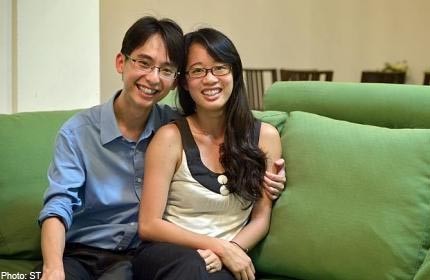Learning from dad to manage finances

Coming from a humble background made Mr Wu Mingze, 27, value the importance of financial planning from a young age.
"My father was the sole breadwinner and provided for the family of four with his salary of less than $2,000 a month about 10 years ago," Mr Wu recalls.
"But we never had to scrimp and save or felt like we were lacking anything, and I'm grateful to my parents for that."
Mr Wu laughs as he speaks about how he, like many young adults today, often laments at the high cost of living and how he does not earn enough money.
"There is this fear that we can't provide for ourselves and our children," he says. "But my father did it, even though his income was less than one-fourth what my wife and I make today."
And Mr Wu aspires to be as financially resilient as his parents were.
He works as a currency strategist at a brokerage which allows its clients to trade in foreign currencies.
His love for trading extends to his personal investments as well, and Mr Wu is active in the forex market.
"There is no conflict of interest between my work and personal investments, but I have to declare the amount of trades with the company," he explains.
The foreign exchange market appeals to Mr Wu as its movements are based on more than just sentiment, including market expectations as well.
And that is what he does for a living - study market trends and predict where currencies are headed.
So it makes sense for Mr Wu to kill two birds with one stone and apply his research and knowledge at work to grow his nest egg.
As forex trading requires leveraging, Mr Wu cautions investors out there not to execute a trade which will cause them to lose sleep over.
"Do not let trading affect your bread and butter or disrupt your life," he says.
Mr Wu married his fiancee Joan last November.
Q: Are you a spender or a saver?
My wife and I do not have a joint account, so I'm the spender in the family because I pay the household expenses.
But I make it a point to save about 20 per cent to 30 per cent of my salary each month.
Q: How much do you charge to your credit cards every month?
On average, I charge about $1,500 to my credit card a month, usually at food and beverage outlets or on shopping for my wife. As we got married a year ago, there might be the occasional one-off expense on a piece of furniture or decorative item that can cost a few hundred dollars.
Q: What financial planning have you done for yourself?
I try to put my money into investments which can give me an average 5 per cent return per year.
I have been trading on the forex market and contracts for difference (or CFDs) on indices and commodities.
These instruments give me a better return than investment-linked products, as I do not have to pay a middle man an administrative fee or performance premium.
I also bought some health insurance policies recently as part of my family planning, as the premiums are still low since I'm healthy.
As newlyweds, my wife and I ensure that we keep one year's worth of our annual salaries as cash to cover any large-expense items.
Q: Moneywise, what were your growing-up years like?
I grew up in a four-room HDB flat with my parents and younger brother.
My dad, a shipping executive, earned less than $2,000 a month.
I remember getting $30 a month during my days at Raffles Junior College. To supplement my pocket money, I gave tuition to secondary school students and also conducted piano and violin lessons.
Q: How did you get interested in investing?
It was some time in my junior college years, when my peers and I deemed doctors, lawyers, pilots, bankers and traders as "cool" professions.
Out of the four subjects I took then, I had a keen interest in economics.
But my real exposure to investments was some time around my 20th birthday, when my friend asked me to accompany him to attend a talk on options trading.
About two years later, I put in $3,000 and opened my Central Depository account.
Q: What property do you own?
None at the moment, but my wife and I applied for a Build-to-Order four-room flat in Punggol. The 1,006 sq ft unit cost us about $350,000 and will be ready some time in 2015.
Q: What's the most extravagant thing you have bought?
I'm not much of a shopper or one who buys things. So my most extravagant expense would be our honeymoon last December in the United States. The 21-day trip cost me more than $10,000.
Q: What's your retirement plan?
I hope to work all my life because I enjoy what I do, although my wife might not like me being a workaholic.
For most men, our earning potential would peak at about 40. From that point, I'll probably have to go for safer products which move at a slower pace to preserve my wealth.
Q: Home is now...
My parents-in-law's semi-detached property, which was vacant, on Eng Kong Road. It has four bedrooms and an area of more than 1,600 sq ft. I'm waiting for my flat to be ready.
Q: I don't drive...
Because a car is a depreciating asset and it does not make sense to have one in Singapore, given the high certificate of entitlement prices.
Besides, I do not have a driver's licence. I usually take a bus to work.

Get a copy of The Straits Times or go to straitstimes.com for more stories.